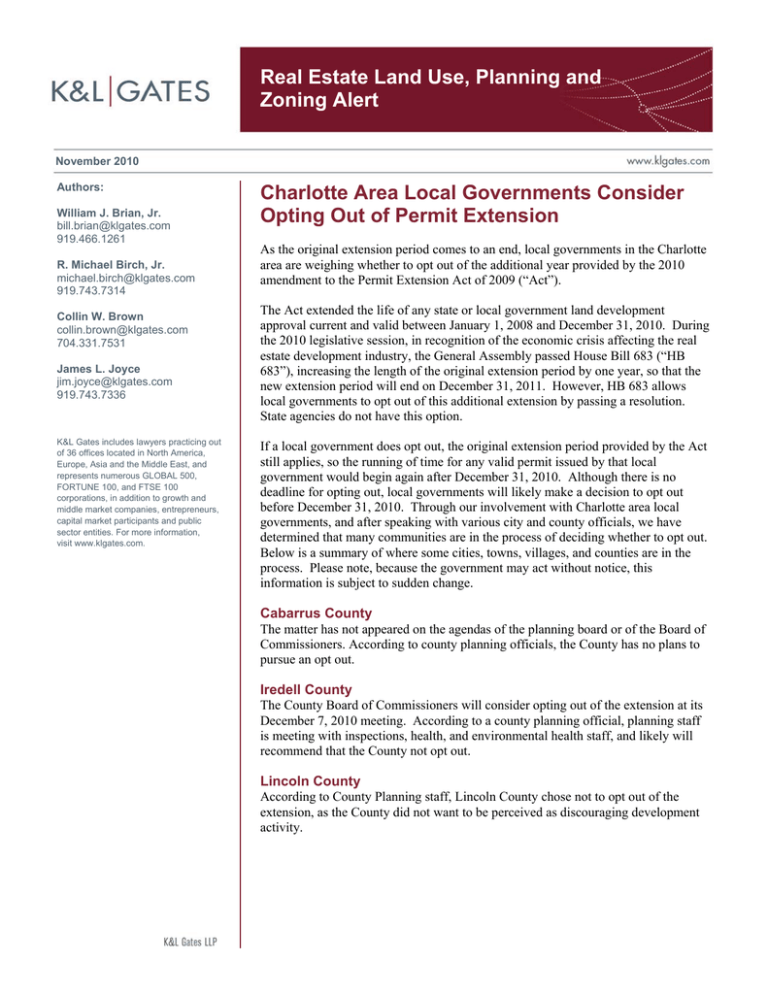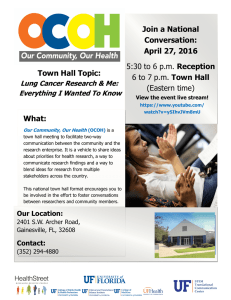
Real Estate Land Use, Planning and
Zoning Alert
November 2010
Authors:
William J. Brian, Jr.
bill.brian@klgates.com
919.466.1261
R. Michael Birch, Jr.
michael.birch@klgates.com
919.743.7314
Collin W. Brown
collin.brown@klgates.com
704.331.7531
James L. Joyce
jim.joyce@klgates.com
919.743.7336
K&L Gates includes lawyers practicing out
of 36 offices located in North America,
Europe, Asia and the Middle East, and
represents numerous GLOBAL 500,
FORTUNE 100, and FTSE 100
corporations, in addition to growth and
middle market companies, entrepreneurs,
capital market participants and public
sector entities. For more information,
visit www.klgates.com.
Charlotte Area Local Governments Consider
Opting Out of Permit Extension
As the original extension period comes to an end, local governments in the Charlotte
area are weighing whether to opt out of the additional year provided by the 2010
amendment to the Permit Extension Act of 2009 (“Act”).
The Act extended the life of any state or local government land development
approval current and valid between January 1, 2008 and December 31, 2010. During
the 2010 legislative session, in recognition of the economic crisis affecting the real
estate development industry, the General Assembly passed House Bill 683 (“HB
683”), increasing the length of the original extension period by one year, so that the
new extension period will end on December 31, 2011. However, HB 683 allows
local governments to opt out of this additional extension by passing a resolution.
State agencies do not have this option.
If a local government does opt out, the original extension period provided by the Act
still applies, so the running of time for any valid permit issued by that local
government would begin again after December 31, 2010. Although there is no
deadline for opting out, local governments will likely make a decision to opt out
before December 31, 2010. Through our involvement with Charlotte area local
governments, and after speaking with various city and county officials, we have
determined that many communities are in the process of deciding whether to opt out.
Below is a summary of where some cities, towns, villages, and counties are in the
process. Please note, because the government may act without notice, this
information is subject to sudden change.
Cabarrus County
The matter has not appeared on the agendas of the planning board or of the Board of
Commissioners. According to county planning officials, the County has no plans to
pursue an opt out.
Iredell County
The County Board of Commissioners will consider opting out of the extension at its
December 7, 2010 meeting. According to a county planning official, planning staff
is meeting with inspections, health, and environmental health staff, and likely will
recommend that the County not opt out.
Lincoln County
According to County Planning staff, Lincoln County chose not to opt out of the
extension, as the County did not want to be perceived as discouraging development
activity.
Real Estate Land Use, Planning and Zoning Alert
Mecklenburg County
Mecklenburg County has considered opting out, but
the matter has not appeared on the Board of
Commissioners’ agenda and County staff report that
the County has no plans to opt out.
Union County
The County Board of Commissioners considered
and rejected a resolution to opt out of the extension
at its October 18, 2010 meeting.
City of Charlotte
The matter has not appeared on the City Council’s
agenda and staff has no plans to pursue a resolution
opting out of the extension.
City of Concord
The issue of opting out of the permit extension has
not appeared on the City Council agenda.
Town of Cornelius
According to Town officials, the Town of Cornelius
will not opt out of the extension.
Town of Davidson
Although the Town Planning Department considered
recommending that the Town opt out of the
extension, planning staff has not made a
recommendation to the Town Board and the Board
has not discussed the issue.
Town of Huntersville
According to planning staff, the planning department
is recommending that the Town not opt out of the
extension. It has submitted a memorandum to that
effect to the Town Board. The Town may
nevertheless consider opting out at its December 6,
2010 meeting.
Village of Marvin
The Village Council voted to opt out of the
extension at its November 9, 2010 meeting.
Town of Matthews.
The Town considered opting out of the extension,
but has not taken any action to opt out.
Town of Mint Hill
Town planning staff has indicated that the Town
will not take any action toward opting out of the
extension.
Town of Mooresville
According to Town planning staff, the matter is
being discussed by the town attorney and town
manager, but staff has not yet issued a
recommendation.
Town of Pineville
The Town considered opting out of the extension,
but has not taken any action to opt out.
Town of Waxhaw
At its November 16, 2010 meeting, the Town Board
of Commissioners adopted a resolution to opt out of
the extension.
Town of Weddington
The Town staff drafted a resolution to opt out for
the Town Council’s consideration, but the Council
voted not to opt out of the extension.
Almost all local government development approvals
will be affected by a local government’s decision to
opt out of the additional year extension. Because
the initial extension period ends on December 31,
2010, many local governments will be making
decisions in the next few weeks on whether to opt
out. Because local governments can opt out without
notifying the public or permit-holders, those with
current entitlements should be paying very close
attention to what decisions are made.
For more information, please read the original
Permit Extension Act of 2009, House Bill 683, and
K&L Gates’ prior analysis of HB 683.
November 2010
2
Real Estate Land Use, Planning and Zoning Alert
Anchorage Austin Beijing Berlin Boston Charlotte Chicago Dallas Dubai Fort Worth Frankfurt Harrisburg Hong Kong London
Los Angeles Miami Moscow Newark New York Orange County Palo Alto Paris Pittsburgh Portland Raleigh Research Triangle Park
San Diego San Francisco Seattle Shanghai Singapore Spokane/Coeur d’Alene Taipei Tokyo Warsaw
Washington, D.C.
K&L Gates includes lawyers practicing out of 36 offices located in North America, Europe, Asia and the Middle East, and represents numerous
GLOBAL 500, FORTUNE 100, and FTSE 100 corporations, in addition to growth and middle market companies, entrepreneurs, capital market
participants and public sector entities. For more information, visit www.klgates.com.
K&L Gates is comprised of multiple affiliated entities: a limited liability partnership with the full name K&L Gates LLP qualified in Delaware and
maintaining offices throughout the United States, in Berlin and Frankfurt, Germany, in Beijing (K&L Gates LLP Beijing Representative Office), in
Dubai, U.A.E., in Shanghai (K&L Gates LLP Shanghai Representative Office), in Tokyo, and in Singapore; a limited liability partnership (also named
K&L Gates LLP) incorporated in England and maintaining offices in London and Paris; a Taiwan general partnership (K&L Gates) maintaining an
office in Taipei; a Hong Kong general partnership (K&L Gates, Solicitors) maintaining an office in Hong Kong; a Polish limited partnership (K&L
Gates Jamka sp. k.) maintaining an office in Warsaw; and a Delaware limited liability company (K&L Gates Holdings, LLC) maintaining an office in
Moscow. K&L Gates maintains appropriate registrations in the jurisdictions in which its offices are located. A list of the partners or members in each
entity is available for inspection at any K&L Gates office.
This publication is for informational purposes and does not contain or convey legal advice. The information herein should not be used or relied upon
in regard to any particular facts or circumstances without first consulting a lawyer.
©2010 K&L Gates LLP. All Rights Reserved.
November 2010
3






